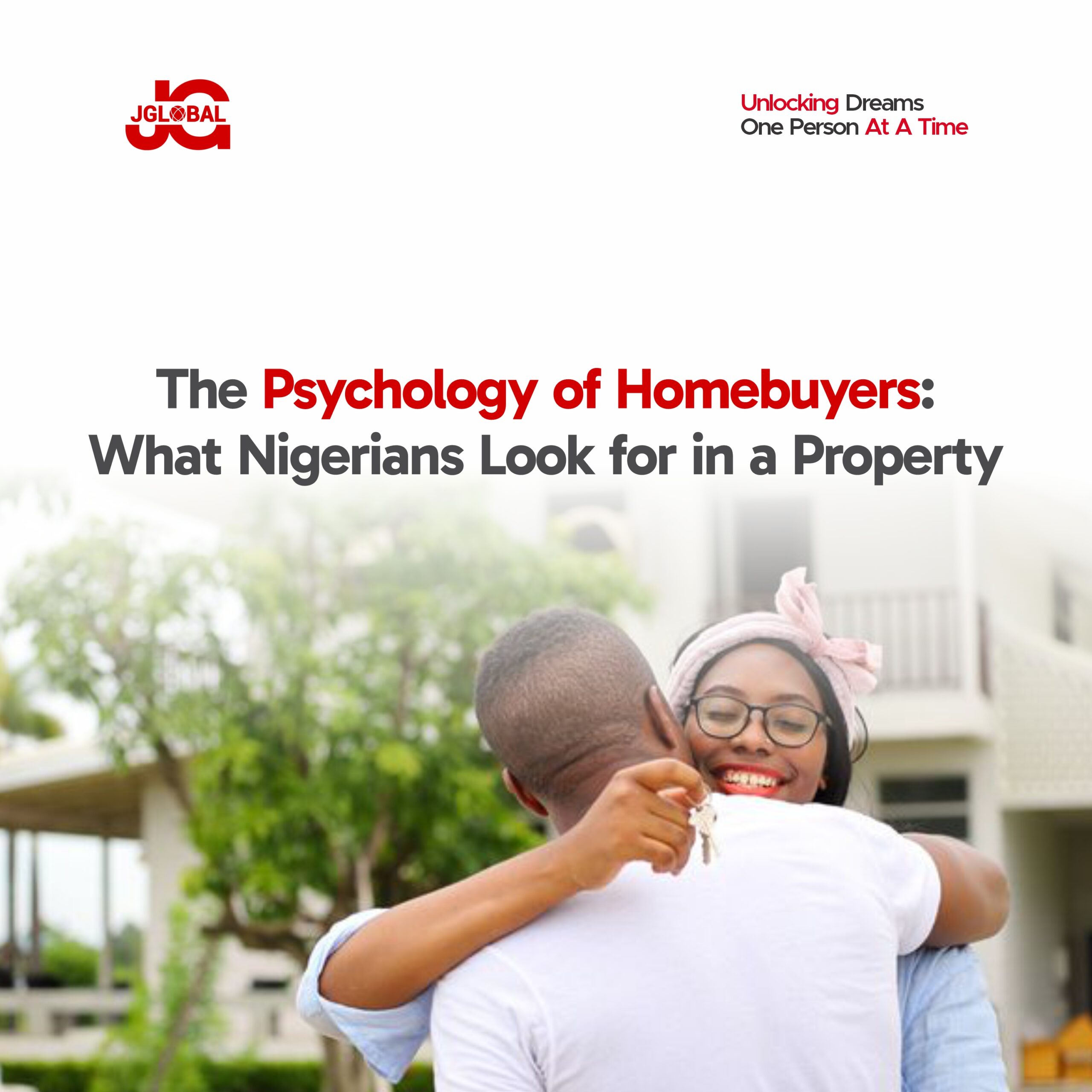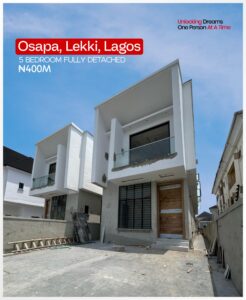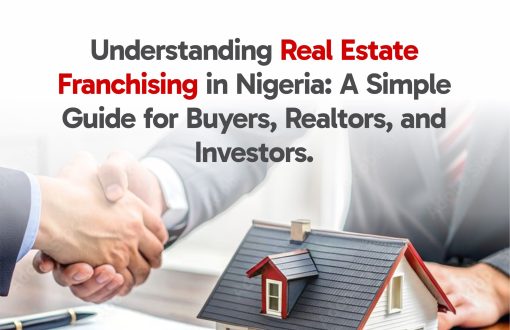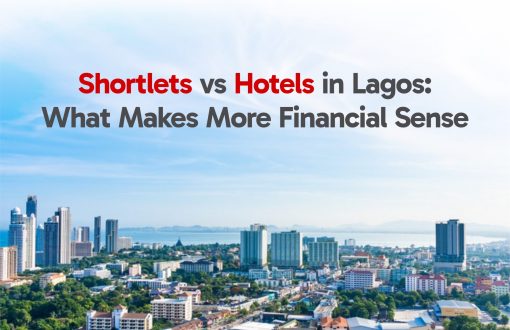The Psychology of Homebuyers: What Nigerians Look for in a Property

With a population exceeding 200 million and an urbanisation rate climbing steadily yearly, Nigeria’s housing demand is reaching unprecedented levels. Homeownership is no longer just a financial milestone in cities like Lagos, Abuja, and Port Harcourt; it’s a personal, emotional, and even cultural statement. Cognitive biases and social influences shape decision-making.
According to multiple real estate analyses, what fuels the Nigerian property market today is not just affordability or infrastructure. It’s psychology, the cognitive reasoning of people.
This blog unpacks that emotional core. We’ll explore the psychological factors that influence how Nigerians choose where and how to live. Starting from the status-driven purchases in highbrow Lagos communities to the rising demand for smart homes, eco-friendly designs, and gated estates, we’ll break down the motivations behind each of these choices.
Understanding these psychological cues is more important than ever, especially if you’re a developer, investor, or buyer trying to make sense of this fast-evolving market.
The Emotional Psychology of Nigerian Homebuyers
Buying a home is rarely a cold, analytical decision in Nigeria. It is also deeply emotionally shaped by a mix of personal aspirations, social expectations, and cultural pressures. The concept of having a home carries a lot of emotional weight. People consider their homes as places of comfort and security.
For instance, when you plan on buying a house, you begin to envision memories in the house. A family man thinks, “My wife’s workspace will fit this corner, or my children won’t have enough space to play around.” This is why emotional attachment plays a significant role in people’s final decision while purchasing a home.
Moreover, house hunting is inevitably stressful, such that many emotions will surface. It could be the excitement of finding a home or the lack of anxiety that comes with knowing that your decision will stay with you for a long time. There is also the pressure that comes from not wanting to miss out on a reasonable offer, which makes you act quickly out of fear of losing your dream home.
There are five emotional drivers that shape how Nigerians approach homeownership: status and social validation, the need for stability and safety, fear of missing out (FOMO), the sentimental pull of family legacy and personal dreams, and for community and personal identities. These forces often operate quietly but significantly influence the kind of properties Nigerians buy and why they buy them.
- Status and Social Validation
Societal influence plays a critical role in the decision-making and behaviours of prospective house owners. People often seek validation from their peers or family members when making important decisions. Buying a home is not an exception.
This is when individuals seek guidance from their friends and families for reassurance. For instance, if you are a young adult who just arrived in Lagos and is looking to get your first house in Ikoyi, you are naturally motivated to seek guidance from friends and family, especially if you believe they understand the place better than you do. Their positive or negative feedback will strengthen or reduce your willingness to get that property because of your confidence in their decision.
At the same time, some people consider property ownership a public badge of success. Living in high-profile areas is their silent proclamation of upward mobility. For this reason, they look out for homes that give them a sense of pride or achievement. Whether it’s a luxury apartment with a waterfront view or a well-positioned duplex in a gated estate, the home becomes a stage for their social recognition.
- A Sense of Security and Stability
Owning a home in Nigeria offers psychological refuge because of the consistent economic and political instability. Unlike renting a house, which often comes with uncertainty and constant negotiations, homeownership gives one a sense of permanence.
A person who has experienced several impromptu new tenancy agreements or, worse, a sudden eviction notice because the homeowner woke up one morning and decided they wanted to sell will find it hard to truly settle in a rented apartment because they have no assurance of stability. They naturally begin to yearn for house ownership.
Compared to a person who lives in a house they own, having a home, where you have absolute sovereignty over what happens in the house, provides a sense of security. Here, you have the luxury of making plans or making permanent decisions about the house.
This factor motivates buyers’ decisions to buy a house. They begin to consider homeownership as a financial goal and a way to regain control, establish permanence, and build a more predictable life in an otherwise uncertain environment.
- The Fear of Missing Out (FOMO)
The Nigerian real estate scene moves fast, especially in competitive markets like Lagos, Port-Harcourt, and Abuja. Buyers, especially those influenced by agents and developer marketing, often feel a pressing urgency to “lock something down” before prices skyrocket or the land runs out. Ola of Lagos’ advertisement slogan, “you will love it” is a perfect example of this.
The concept of scarcity can influence your behaviour as a prospective buyer. The fear of missing out on a desirable property due to limited availability can prompt you to buy immediately without thorough consideration of all factors or even make you buy higher offers than you initially planned.
This sense of urgency, driven by the fear of missing out on this sweet-looking offer, adds unnecessary pressure to the buying process. Developers know this and use it masterfully: “Only two units left!” or “Prices are increasing next week!” They intentionally create these artificial deadlines to emphasise the uniqueness of the property. It’s marketing, and it’s a trigger for action.
- Homes as Symbols of Family Legacy and Fulfilled Dreams
Some individuals buy homes to fulfil a long-held family goal or personal dream. They might be motivated by the desire to give children a stable upbringing, such as making sure the kids live in a good neighbourhood or attend a good school, care for aging parents under one roof, or finally own the kind of house that once seemed out of reach.
Imagine this: you’ve lived in a rented apartment with your parents all your life, and you don’t remember ever experiencing 24 hours of peace because of that one noisy next-door neighbour and her six children or the feeling of stability because your greedy landlord is bent or increasing the rent every six months. You get a decent job, the pay is excellent, and you just can’t wait to finally fulfil your long-term dream: to buy a home with your parents’ name on it.
Emotional drivers like these often outweigh the hard price metrics per square meter or resale value. After 29 years of living as tenants, your dream is coming to fulfilment. Who cares about resale value? The house becomes not just a place but a personal triumph.
- Community and Personal Identity
Lastly, the influence of emotions in decision-making is also exhibited in how people choose where they want to live based on who they are, who they want to be, and what they value. For example, communities of bikers, creatives, or religious groups often gravitate toward areas where their lifestyle is mirrored, where their values feel seen and shared.
A similar trend is emerging among Nigeria’s pet owners, whose population has significantly increased in the past decade. These pet parents sometimes seek out neighborhoods where they’re surrounded by people who understand and share their lifestyle.
They let the things that matter or are valuable to them influence their housing decisions. Dog parents and owners, for example, are aware that different factors, including the space their dogs live in, can be the reason why dogs hate or love socialising. Therefore, instinctively, when they notice that there are other people who share their sentiments, they are more motivated to purchase a home near other pet parents or a veterinary doctor, which means their dog isn’t isolated. They’re part of a support system that makes caring for pets easier.
This emotional commitment to finding a space that defines their values and gives them a community to which they want to belong, influences their choice of buying homes.
Cultural Values (Psychology) Shaping Home Choices
Culture plays a significant role in shaping how people think about home in Nigeria. Recent studies have shown that cultural values influence individuals‘ decision-making. From where they live, the things they purchase and how they want to use it.
Cultural values shape purchasing decisions in consumer behaviour, necessitating tailored marketing strategies and impacting factors like quality consciousness and brand loyalty.
Let’s discuss the three key cultural influences that guide Nigerian homebuyers: the enduring value of communal living, traditional and modern design tastes, and how ethnic identity and heritage subtly guide geographic preferences.
- Communal Living and the Need for Space
Nigeria has over 250 tribes, so it’s no wonder the idea of the “nuclear family” does not always apply in some cultures. It’s not uncommon to have aunties, cousins, grandparents, and even in-laws living under the same roof or visiting you frequently.
Do you remember how a family member once had their wedding, and everyone had to travel “home,” but somehow, “Big Mummy’s” house was enough to entertain the household? Exactly.
This rooted value of family interconnectedness means that buyers often look for properties with multiple bedrooms, large living spaces, and extra guest rooms because home-based celebrations, sleepovers, and impromptu family meetings are considered.
Developers who understand this cultural need increasingly offer floor plans prioritising room count and features like outdoor lounges or boys’ quarters (BQ) to accommodate extended families.
In some families, the emotional weight of homeownership is so profound that it becomes an act of legacy. Some traditional parents, in good gestures, choose to vacate the main house for their adult child and their new family, relocating to the boys’ quarters themselves not out of necessity but to ensure that their child remains rooted in the family home.
- Traditional and Modern Housing Features
Traditional and modern housing features influence home-buying decisions. While modern features like open-plan kitchens, floor-to-ceiling glass windows, and minimalist architecture are trending, many Nigerians still find satisfaction in traditional motifs. Think carved wooden doors, ornamental railings, patterned tiles, large windows purely for proper ventilation in the living room, and indigenous building materials like stone finishes.
These details are decorative, yet they carry cultural symbolism. Apart from signalling pride in heritage, they often suggest a subtle rejection of fully Westernised designs. The need to live by one’s heritage or culture also dramatically influences people’s choices when house-hunting.
We’re seeing a rise in what could be called “Afro-modern” home properties that blend contemporary function with cultural form.
- Cultural Identity in Geographic Preferences
Cultural identity refers to the unique characteristics, beliefs, and expressions that define a group of people and shape their relationship with the environment.
Research on cultural identity and geographic preferences reveals a strong connection between cultural values and location choices. Individuals favour locations symbolically associated with their culture to reinforce belonging.
Sometimes, where someone buys is just as meaningful as what they buy. Cultural identity can influence location choices, especially for older buyers or diasporan Nigerians looking to “go back home.”
An Igbo person in diaspora might prefer investing in the Southeast because it’s where they come from and where they call home because they want to give back to their community, while a Hausa family may prioritise specific communities in the North. Why is that? The attachment they feel to their roots and the sense that they belong to a particular ethnic group influence their decision to choose a location.
Even within multicultural urban centers like Lagos and Abuja, there are informal cultural clusters where people feel “at home” because their language, food, or customs are common in that environment. These subtle preferences reflect a deep human need for belonging, familiarity, and cultural continuity.
So, What Now?
The psychology of home buying, especially for prospective home owners in Nigeria, is a mix of complex cultural influences, social dynamics, and emotional biases.
Understanding these layered factors is a competitive advantage for realtors or developers. Still, it is essential for buyers as it helps them manage their emotions and be mindful of external influences, like the marketing tactics involved in house-hunting in Nigeria.




